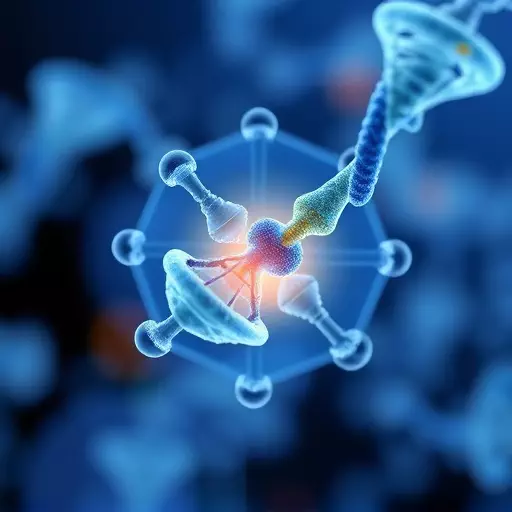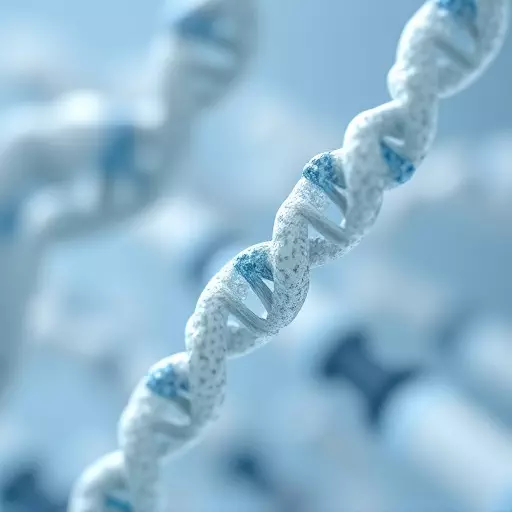The future of functional recovery is bright with 3D bioprinting technology and epigenetic advancements. This innovative approach combines precise bioengineering with personalized medicine to revolutionize healthcare in Bloomington-Bedford. By integrating epigenetics into functional protocols and leveraging peptide therapies, healthcare providers can create tailored biomaterials for enhanced cellular growth and regeneration. This game-changing method promises unprecedented precision and efficiency in treating complex conditions, offering hope and improved quality of life for those seeking recovery. Advances in 3D bioprinting coupled with epigenetic insights are set to transform functional care, enabling cutting-edge solutions for various medical challenges.
The future of functional recovery is here, driven by revolutionary technologies like 3D bioprinting. This cutting-edge approach holds immense potential to transform healthcare, especially in Bloomington-Bedford and beyond. By integrating epigenetics—the next frontier in functional protocols—with advances in peptide therapies, we’re unlocking personalized treatments that were once unimaginable. Get ready for a game-changer that promises improved tissue and organ regeneration, enhanced accessibility, and tailored solutions for optimal health.
- The Rise of 3D Bioprinting in Functional Recovery
- Epigenetics and Its Role in Personalized Medicine
- Peptide Therapies: Unlocking New Pathways to Healing
- 3D Bioprinting: A Game-Changer for Tissues and Organs
- Customized Treatments with Advanced 3D Printing Technology
- Future Directions: Integrating Epigenetics into Functional Care
- The Impact of 3D Bioprinting on Healthcare Accessibility
The Rise of 3D Bioprinting in Functional Recovery

The field of 3D bioprinting is rapidly evolving and holds immense potential in revolutionizing functional recovery practices, particularly in the realm of functional medicine in Bloomington-Bedford. This cutting-edge technology aims to create biological structures that mimic natural tissues, enabling more effective healing and restoration of functions. With advances in peptide therapies for functional care gaining traction, 3D bioprinting is poised to become a game-changer in personalized healthcare.
The integration of epigenetics as the next frontier in functional protocols further amplifies this potential. By understanding and manipulating gene expressions, 3D bioprinters can customize tissues tailored to individual patient needs. This precision approach promises enhanced results in treating various conditions, from regenerative medicine to complex tissue reconstruction. As research progresses, we can anticipate a future where 3D bioprinting plays a pivotal role in restoring function, offering hope and improved quality of life for those seeking recovery.
Epigenetics and Its Role in Personalized Medicine

In the evolving landscape of functional recovery, epigenetics is emerging as a game-changer, marking the next frontier in personalized medicine. This field studies how our genes are influenced by environmental factors and lifestyle choices, offering profound implications for healthcare. By understanding an individual’s unique epigenetic profile, practitioners in Bloomington-Bedford and beyond can tailor functional protocols to address not just symptoms but underlying causes. This precision approach is particularly impactful in the realm of peptide therapies, where advances continue to revolutionize functional care.
Epigenetic modifications play a crucial role in regulating gene expression, ensuring our genetic code isn’t solely determined by our DNA sequence but also by external cues. This dynamic nature allows for the potential to rewire our biological systems, paving the way for personalized interventions. In the context of functional medicine, this means creating treatment plans that consider not just what’s broken but why it might have developed in the first place. Integrating epigenetic insights into these protocols promises more effective and lasting solutions for those seeking functional recovery.
Peptide Therapies: Unlocking New Pathways to Healing

In the realm of functional recovery, advances in peptide therapies are emerging as a game-changer, especially when combined with the transformative potential of 3D bioprinting. These peptides, intricate sequences of amino acids, hold the key to unlocking new pathways in healing and restoration. By integrating epigenetics as the next frontier in functional protocols, healthcare professionals in bloomington-bedford are revolutionizing treatment approaches that were once limited by traditional methods.
The future of 3D bioprinting promises to customize treatments like never before. Imagine printing bio-compatible materials that can be tailored to an individual’s specific needs, incorporating peptides designed to stimulate cellular repair and regeneration. This innovative technology could revolutionize functional medicine, offering personalized solutions for complex health issues with unprecedented precision and efficiency.
3D Bioprinting: A Game-Changer for Tissues and Organs

3D bioprinting is poised to revolutionize the field of functional recovery and medicine as a whole. This cutting-edge technology has the potential to create complex, bioengineered tissues and organs, offering unprecedented possibilities for treating various health conditions. By combining advanced printing techniques with biological materials, researchers can construct structures that mimic the intricate design of human tissues, complete with vascular networks and cellular components.
In the context of functional medicine in Bloomington-Bedford, 3D bioprinting could be a game-changer. The integration of epigenetics as the next frontier in functional protocols allows for precise customization of these bio-printed structures to match individual patient needs. Moreover, advances in peptide therapies for functional care can further enhance the capabilities of 3D bioprinting, enabling the creation of biomaterials that support cellular growth and regeneration. This innovative approach promises to transform the way we address tissue damage and organ failure, offering personalized and effective solutions for a wide range of medical challenges.
Customized Treatments with Advanced 3D Printing Technology

The future of functional recovery holds immense promise with the integration of 3D bioprinting technology. One of its most compelling applications lies in the realm of personalized, or customized treatments. This innovative approach leverages advanced 3D printing capabilities to create biological structures that mimic the human body at a microscopic level. By integrating this technology with functional medicine in Bloomington-Bedford, healthcare providers can tailor treatment plans to individual patients’ unique needs. Epigenetics, as the next frontier in functional protocols, plays a crucial role here by enabling precise adjustments to genetic expressions, further enhancing the efficacy of treatments.
Advances in peptide therapies for functional care are also set to benefit significantly from 3D bioprinting. Peptides, small chains of amino acids with diverse therapeutic roles, can be precisely deposited and structured using this technology. This ensures controlled releases and targeted delivery, maximizing their potential in repairing and regenerating damaged tissues. With these capabilities, 3D bioprinting promises to revolutionize functional recovery practices, offering highly effective, personalized care that was once unimaginable.
Future Directions: Integrating Epigenetics into Functional Care

The future of 3D bioprinting holds immense potential to revolutionize functional recovery practices, particularly in the realm of functional medicine in Bloomington-Bedford. As technology advances, integrating epigenetics into 3D bioprinting protocols emerges as the next frontier. This innovative approach combines the precision of bioprinting with the dynamic nature of epigenetic modifications, enabling the creation of highly customizable and responsive tissue constructs. By tailoring the genetic and environmental factors within these printed structures, researchers can develop advanced peptide therapies for functional care, enhancing the body’s natural healing processes.
This integration opens doors to personalized medicine where treatments are optimized based on an individual’s unique epigenetic makeup. Such advancements could lead to more effective rehabilitation strategies for various conditions, from tissue damage to complex neurological disorders. With continuous exploration and refinement, 3D bioprinting, coupled with epigenetic insights, promises to bring functional care to a whole new level of precision and efficacy.
The Impact of 3D Bioprinting on Healthcare Accessibility

3D bioprinting has the potential to revolutionize healthcare accessibility, especially in the realm of functional recovery. By allowing the creation of bio-compatible, personalized tissues and organs, it offers a promising avenue for treating previously challenging conditions. This technology can cater to the specific needs of patients seeking functional medicine in Bloomington-Bedford or other regions, ensuring tailored care options that might have been scarce before.
Furthermore, integrating epigenetics as the next frontier in functional protocols enhances the precision and effectiveness of 3D bioprinting applications. Advances in peptide therapies for functional care also contribute to this innovative field. With these developments, healthcare providers can move beyond generic treatments, offering patients a more direct path to restoration and recovery through personalized, bio-engineered solutions.
